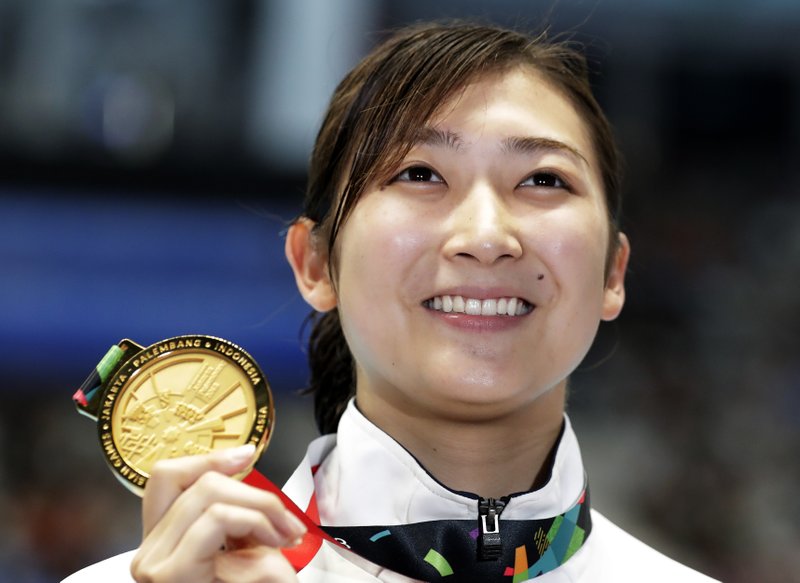
Japan’s Rikako Ikee hold sup her gold medal after winning the women’s 50m freestyle final during the swimming competition at the 18th Asian Games in Jakarta, Indonesia, Friday, Aug. 24, 2018. (AP Photo/Lee Jin-man)
JAKARTA, Indonesia — Rikako Ikee could very well be the smiling face of the 2020 Tokyo Olympics, a new star that organizers are sure to promote during the build-up to the games.
The 18-year-old Japanese swimmer has a lot to be happy about.
Capped by a record eight medals at the Asian Games — six gold — Ikee has become an Olympic favorite, particularly in the 100-meter butterfly where she is chasing the world record.
“If everything goes well, I think I will be able to set the world record,” Ikee said, speaking through a translator to non-Japanese reporters after swimming ended on Friday. “But at the same time, it is not easy.”
A promising junior swimmer who qualified for the Rio de Janeiro Olympics two years ago and finished sixth in the 100 fly, Ikee in the last several weeks has arrived as a rising contender in several events.
The breakthrough started earlier this month in the Pan Pacific Championships in Tokyo, competing against top swimmers from the United States, Australia and Canada.
She won the 100 fly in 56.08 seconds, the fastest time of the year and ahead of the best time this season by Sarah Sjostrom of Sweden, the Olympic champion, world champion and world record-holder.
Sjostrom holds the world mark at 55.48, and Ikee — pronounced E-kay — is closing in.
Ikee was also second at the Pan Pacs in the 200 freestyle — her second best race — just behind Canadian Taylor Ruck but ahead of American Katie Ledecky, the five-time Olympic champion who has dominated the freestyle evens from 200- to 1,500-meters.
“I gained confidence when I won the 100 butterfly, since this is the main race for me,” she said. Her confidence in freestyle was also boosted, she said, “because I couldn’t compete well with the world’s top swimmers in freestyle before. I think I can compete with the top swimmers in the world in these two races.”
Japan is hoping to win 30 gold medals overall at the next Olympics, an ambitious target and double its gold-medal take in Rio.
Nations hosting the Olympics usually get a home-field boost. And swimming will be a big part of it, with Japan expected to challenge the United States and China in one of the most high-profile sports at the Olympics.
Japan and China finished with 19 gold medals apiece in swimming at the Asian Games, both teams testing young swimmers and new names in a warm up for Tokyo.
“We are getting closer to the world’s top countries little by little, like the United States, Australia, and China,” Ikee said. “When you look at relay races, you can tell that.”
Besides Ikee, several Japanese also won multiple gold medals in individual races.
Yasuhiro Koseki won the men’s 50, 100 and 200 breaststroke, and Daiya Seto took the 200 fly and 400 IM. Satomi Suzuki won gold in the women’s 50 and 100 breaststroke.
Ikee described the push by Japan to double the gold-medal count in Tokyo as a “drastic challenge.”
Asked if she felt the pressure as the home-country favorite, she said “no.” But then rolled her eyes and paused to explain why. She said success reinforced more training, which led to more medals.
“I don’t feel the pressure too much,” she said. “For me, I gain strength from the cheering and pressure. I make up my mind to work harder, and when I get more support it becomes by motivation.”